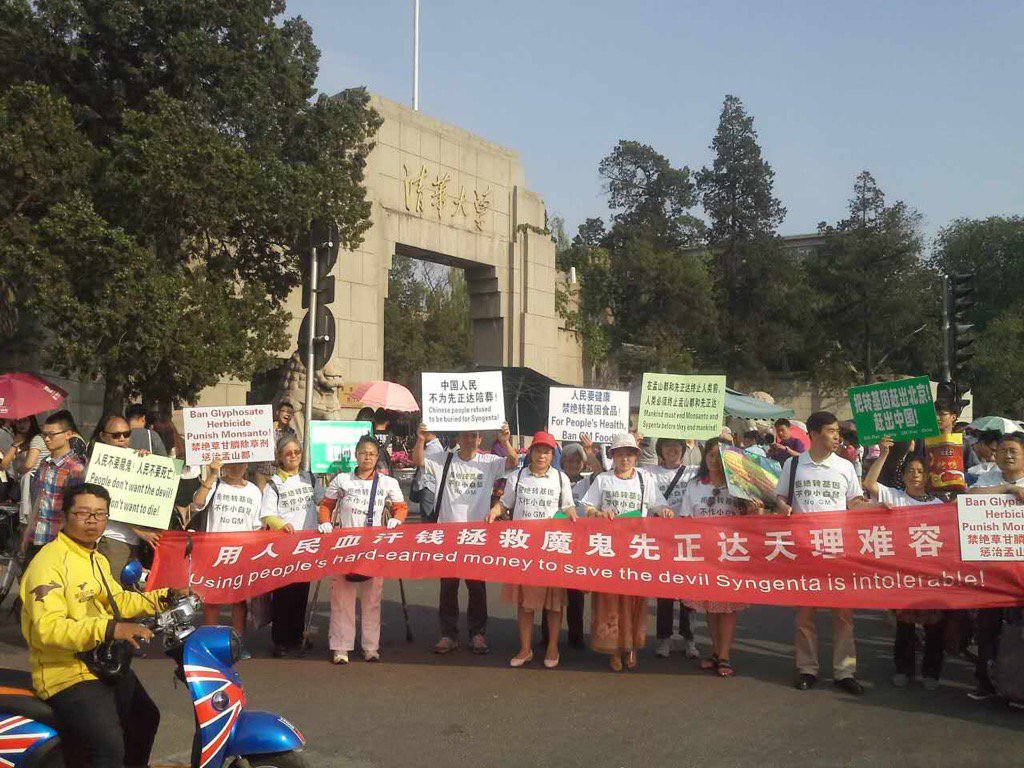You can read about the reason I’m asking this in the spoiler. TLDR I’m just wondering if there’s some debunking I can do since western media is oh-so-not-trustworthy
spoiler
I’m in some IRL debate (Well, online but in a closed chat) with some libs. They are talking about the right-wingers saying Taylor swift is being paid off to spread democratic votes, whatever, hollyweird are all dems, no conspiracy needed.
I mentioned that we need to actually, you know, actively keep conspiracy theories from spreading, and my liberal friend is gishgaloping a bit, but I’ll bite since they are sincere, even if wrong.
They came back with “Well china has conspiracy theories”, which I didn’t mention china, I didn’t mention anything about censorship, it’s just gishgalloping like I said, but anyway…
Any truth to this one? I mean being anti-gmo is not rare, so I’m not surprised if it was true. I don’t have a good handle on high quality china news (And cannot read their sites myself, even with translators it’s a slow experience).
Edit: Oops, I had to go AFK after posting this and didn’t get to clarify as the comments were all being. I meant do Chinese people broadly believe in the conspiracy theories around GMOs such as causing cancer or making your DNA change or something like that. Of course GMOs are complicated science and are a tool used by capitalists to patentize (did I make up that word? Lol) the food industry, which is a natural science and typically difficult to patent.
Source is funded by Bill & Melinda Gates: https://mediabiasfactcheck.com/alliance-for-science/
Who are major shareholders in GMO monopoly: https://www.theguardian.com/global-development/poverty-matters/2010/sep/29/gates-foundation-gm-monsanto
So you’ve a Monsanto source saying “criticism of Monsanto is a crazy conspiracy theory”
Recombinant DNA technology per se isn’t harmful.
The GMOs actually on the market, like Roundup Ready Maize, are an attempt to patent, monopolise, and control agriculture.
So yes, GMOs are a tool of capitalist hegemony.
It’s crazy, Monsanto is like there wherever GMO’s are.
Sorry, I posted this and then went afk. I need to clarify. Ha ha.
Totally understand and agree!
I was thinking more along the lines of do people in China believe GMOs are bad for your health, Or that “eating gmos makes you a GMO”, and other bullshit like that, that you would find in America. Do you know if Chinese people typically believe in the fake science around that?
GMO being unsafe was believed and actively promoted by almost every adult I knew when I was a kid. I’m French. Anti-GMO is literally one of the most common misconceptions in the public
Edit: also yes Monsanto and shit is real and harmful, even if genetic manipulation isn’t bad in itself
Humans have been gene editing since the start of agriculture. That is literally what selective breeding and splicing is.
The modern version is just accelerated, and it has saved the lives of billions of people.
Crops have been modified to require less water. Most grain is modified to be reinforced with iron and other nutrients. Cotton can have double the yield with little resources. etc.
That’s the bit I don’t get about the whole fuss around genetic modification. It’s not new! But people are easily scared about (purposefully mysterious) things that happen in labs, whereas it’s much more “natural” or whatever for the farmer to be doing it in the field.
I am cautious about GMO. While there are obvious benefits to the specific improvements we can rapidly introduce, I think there are also reasons to be wary. Genetic diversity of staple crops is infinitely important, and should be protected. GMOs do not exist in a vacuum, and I am not at all confident that our current systems will exercise the caution and foresight to ensure we don’t end up with some catastrophic outcome due to worldwide monocropping.
My understanding of the really existing downsides is that in the current form of genetic modification it can lead to lack of biodiversity and further control for agro corps through ip laws.
Thanks to @yogthos@lemmygrad.ml for the ping. Let’s look at the study linked by the article: Public perception of genetically-modified (GM) food: A Nationwide Chinese Consumer Study https://www.nature.com/articles/s41538-018-0018-4
There has been a general lack of fundamental studies on the public’s scientific perception and policy interpretation of GM food. Moreover, the scope of previous surveys has been limited to a few of the largest cities in developed areas of China, with little or no coverage of rural areas. In all cases, the number of respondents in most of these earlier surveys was less than 1000. This study summarizes the status of GM food in China and provides the results of questionnaires that surveyed consumers from every province on their knowledge level, present attitudes, and future thoughts of GM food in China. A statistically relevant sample size of 2063 questionnaires were satisfactorily completed.
The reasons given by consumers in favor of, or against, the use of GM food, were complex, as seen by the response of 13.8% of respondents who felt GM technology was a form of bioterrorism targeted at China.
I’m not going to question what is “statistically relevant”, but I think it’s insane for Alliance for Science to extrapolate 13.8% of 2063 people to all 1.4 billion people in China (regardless of age or background) to get 190 million.
If we look at the results for the question:
There is an opinion that the transgenic technology from the US maybe the bioterrorism to China. If you are a patriot, you should oppose GM food. What do you think about this?
- 13.8% Agree, patriot should oppose GM food
- 54.4% Disagree, debate on GM food should base on science
- 31.8% I have no idea about that
The option wasn’t “I agree that GM tech is US bioterrorism against China”, it was “The question is presenting an opinion that suggests Chinese patriots should oppose GM food because they are part of US bioterrorism against China, I agree”. What a twisted way to conduct a survey.
Besides the Chinese person mentioned in the article (彭光谦, Peng Guangqian, Baidu wiki includes the GMO controversy: https://baike.baidu.com/item/彭光谦/8993457) there was also this person called 崔永元 (Cui Yongyuan, Baidu wiki: https://baike.baidu.com/item/崔永元/324929) who was a famous CCTV show host, and he was anti-GMO.
China’s Ministry of Agriculture and Rural Affairs responded to Peng Guangqian’s questions about transgenic technology in this 2013 article (http://www.moa.gov.cn/ztzl/zjyqwgz/sjzx/201310/t20131018_3634054.htm), and created this special page for info related to transgenic technology (http://www.moa.gov.cn/ztzl/zjyqwgz/) that is still updated to this day.
Even though it may be interesting to some, but I think finding out how many people in China believe “the US is carrying out bioterrorism against China via GM food” is not a worthwhile thing to do, compared to the more important question of how to carry out research regarding transgenic technology safely and scientifically. I personally think transgenic tech is inherently a complicated topic so I’m neutral about it.
There are other theories regarding US bioterrorism like whether the US caused covid-19, no matter if it was intentional or by accident, now that theory has more support and is indirectly encouraged by the Chinese government. For example, from this Chinese Foreign Ministry Regular Press Conference transcript on 2021-08-27: http://ipc.fmprc.gov.cn/eng/fyrth/202108/t20210827_9130747.htm
The US side said they need “reasons” to support an investigation in the US. Then, please answer the following questions. First, patients of the EVALI outbreak in July 2019 in Wisconsin in the US had symptoms highly similar to that of COVID-19. Isn’t this a reason? Second, according to the US NIH website, research has shown that evidence of infection in five states appeared back in December 2019. Isn’t this a reason? Third, the US government sealed blood samples collected before January 2, 2020 from further testing on the ground that it interferes with the origins tracing agenda and is detrimental to US national security. Isn’t this a reason? Fourth, Florida Department of Health once removed data from its website that showed 171 patients had coronavirus symptoms or positive test results in January and February, 2020. Isn’t this a reason? Fifth, many comments on social media like Facebook indicate that more than 200 people in the US or countries having close ties with the US said publicly people they know or they themselves had suspected infection of the novel coronavirus as early as in November 2019, with COVID-like symptoms. Isn’t this a reason? Sixth, 12 countries including Costa Rica and Kenya publicly said that their “patient zero” of COVID-19 came from the US. Isn’t this a reason? Seventh, Fort Detrick and the University of North Carolina (UNC) have a dark chapter in history and poor safety records of coronavirus researches. The US Army Medical Research Institute of Infectious Diseases, which is based in Fort Detrick, was shut down by the US CDC because of serious safety incidents in the fall of 2019, before the outbreak of COVID-19. Isn’t this a reason?
Given that the US is confident that it has nothing to hide, then it should face up to the questions of the international community by inviting the WHO to do the origins study in Fort Detrick and the UNC, and release the raw data on early cases in the US. Should the US refuse to cooperate, it would only further expose its true intention of politicizing origins study.
It’s as if these surveys are intentionally crafted to give the result they’re fishing for.
Also the option “Disagree, debate on GM food should base on science” also feeds into Chinese liberals’ talking point that Chinese patriots favor patriotism over science, as if those two are mutually exclusive.
Thank you for responding! I’m happy to be able to pick the brains of real people with real experiences on this platform.
I didn’t have a long time to look at the study itself, so I apologize that this was easy to find. But were those questions translated? I just don’t know if “patriot” is a common word over there.
It does seem weird the way they phrased things as if there are real binaries between them. Why can’t somebody both be pro-science and pro-patriot?
I have an undergrad in psychology at an American university, which for the most part is kind of a waste of time, but I did spend some time reading research and doing and reading the results of surveys, and this always bugged me. Surveys are just a terrible way to truly understand somebody’s opinion.
Yeah the questions were translated and the original data in Mandarin is not publicly available, from the study:
Data availability statement
A sample of the questionnaire. translated into English, is available in supplementary information at npj: Science of Food’s website. The completed 2063 questionnaires and the resulting database for the statistical analyses are in mandarin are not publicly available but can be made available from the corresponding author on reasonable request.
The usage of 爱国者 (patriot) is probably not as common as 爱国 (patriotic), 爱国主义 (patriotism), or even 小粉红 (pinky/pinko, both a derogatory term to refer to Chinese patriots/nationalists, but also normalized by patriots to use to call themselves, kind of like the n-word for African Americans). The Chinese tech brand aigo is literally 爱国者 (patriot) in Chinese. Mentions of US “Patriot” missiles in the news are also instances where you can find 爱国者 (patriot).
As for surveys themselves, I can’t speak for whether it is accurate to paint a representation of any large population with a sample size of less than 0.00015% or 1 in 666,667 of the population, even if it’s claimed to be statistically relevant. In this case this particular question about US bioterrorism was constructed in such a loaded way that the results shouldn’t be taken seriously.
Thank you for your insight!
The basic argument against GMOs is that it’s difficult to establish that changes in modified foods are safe long term. There are studies such as this one showing that GMO foods can have adverse effects on humans:
Serious adverse events of GM consumption include mortality, tumour or cancer, significant low fertility, decreased learning and reaction abilities, and some organ abnormalities. Further clinical trials and long-term cohort studies in human populations, especially on GM food-related adverse events and the corresponding GM events, are still warranted.
So, I don’t think it’s exactly a conspiracy theory. On top of that, companies such as Monsanto have zero regard for safety. So, trusting them to do due diligence would be naive in the extreme. Not to mention all the fuckery Monsanto has been doing with GM seeds around the world.
Another consideration is that GMO crops can interbreed with non-GMO plants nearby. It can be difficult if not impossible to predict the knock-on effects of this.
Indeed, once you introduce a new organism into the environment a lot of unintended things can happen very easily.
Considering a lot of crops aren’t exactly native to where they’re grown (and certainly not in monoculture forms) I feel like that is less of a concern, than the real issue- GMOs within the present capitalist system, do pose a serious potential threat to the food security and independence of nations and regions (as others noted in thread- through IP laws, and through the simple fact that it is being pioneered by some particularly evil and untrustworthy corporations).
Exactly, the root problem is capitalism as opposed to GMOs.
I’d argue that it’s less that GMOs themselves are unsafe and more to do with corporate greed, since we get many of our crop breeds today by bombarding plants with radiation and chemicals and picking the ones with positive mutations. I think that compared to those strategies, GMOs are probably only as bad, if not slightly better a choice.
completely agree
Damn, there might be more to the GMO thing than I thought.
I was referring to the crazy american conspiracies, but on a real scientific basis, there’s more to considere than I thought.
Do you know offhand if the crazy conspiracy theories are popular in China. Like “eating GMOs makes you a GMO” kind of blind talking points? Or are their considerations the scientifically (and capitalist) backed ones?
I don’t know enough to say, perhaps @qwename@lemmygrad.ml knows?
People are stupid and gullible all over the world
the idea of GMO, and to a side note, gene editing, revolves around the idea that although its possible to modify a portion of DNA to get a desirable trait, it may have adverse effects on other traits, as a piece of DNA is not 1 to 1 with how its expressed. a single change may affect several expressions, and its a game of how severe those extraneous changes are.
take for example strawberries. natural strawberries to a lot of people are inedible/non desirable, and its only because of GMO that brought it to a state where its desirable.
the part of GMO being used as a way to control people is silly, but the idea of a GMO being potentially dangerous is a completely reasonable statement to make, as long as its backed up with specific examples, as blanket dangering GMO would be like blanket statement cooking, as charing food is confirmed to be directly related to cancer, leading to a (terrible) idea to not cook food.
completely fair to be skeptical about a new GMO product, but for older strains thats have been in the market for decades, would be sort of silly to be afraid of those, given the averge global age of death is much higher than it was a century ago
the part of GMO being used as a way to control people is silly, but the idea of a GMO being potentially dangerous is a completely reasonable statement to make
I’d almost flip that: GMOs are no more dangerous than naturally edited genes (by cross-breeding) but it’s definitely being used as a means of controlling people, societies, and food-systems by selling what should be a non-commodity (heirloom seeds) creating demand for patented and proprietary goods, and making us dependent on their product.
definitely be wary of economic dependancies, but that’s mostly not impossible given that agriculture export is a fairly competitive field, and Brazil has really stepped up in the past few years, In particular to China, even though they are a major producer, they still import a lot, and that’s a china specific problem they have to hurdle. but to find different sources for produce is (mostly) competitive in the current global market.
It’s only when you have a certain crop thats hyper regionalistic and high in demand where it actually becomes a problem for dependencies sake. e.g Alfalfa (typically used as food for cattle) tends to only grow in regions near deserts.
Oh no, I was afk after posting this and now I have to clarify. I was wondering if it was something that was heavily believed in China, not necessarily about the science itself.
More specifically about the whole conspiracy theories around eating GMO foods changes your DNA or has a chance of giving you cancer or something. Of course, GMOs are a very complicated science with a lot of risk involved, but that’s not what I meant.
Weird that the headline is in raw numbers.
The precise question, translated literally from the Chinese, was the following: “There is an opinion that the transgenic technology from the US may be bioterrorism to China. If you are a patriot, you should oppose GM food. What do you think about this?”
While 13.8 percent of respondents selected “Agree, patriot should oppose GM food,” 54.4 percent selected “Disagree, debate on GM food should base on science” and 31.8 percent selected “I have no idea about that.”
Compare these numbers to a Pew survey of Americans:
About half of U.S. adults (51%) think GMOs are worse for people’s health than foods with no genetically modified ingredients, while 41% say GM foods have a neutral effect on health. Just 7% say they are better for health than other foods
The framing in the Chinese survey sounds pretty biased too, rather than just “What is your opinion on GM foods?” it presents a reason why one would be opposed to GM food (but not a reason one might support it), and frames opposing GM as a supposedly more patriotic answer. Despite this framing, Chinese people disagreed with the idea 54% to 14%.
Extrapolating from a survey and then putting it in absolute numbers is suspect, because there’s a lot of people in China and surveys usually have a floor. If a survey only gets 1% of Chinese people saying something, the headline could read “14 million Chinese people believe [thing].”
I don’t really have information on Chinese perspectives on GMOs, the scientific consensus is that it can be done safely but I think there’s some validity to being suspicious of capitalists fucking stuff up with it.
Thank you for your thoughts around this!
It does seem like as responses have trickled in, it’s basically decided that the questions used were pretty biased, 2000 people cannot be extrapolated to 1.4 billion, and the biggest problem with GMOs is mostly around the capitalists creating patented seeds instead of there being just regular seeds that you could get for extremely cheap or free (from last years round of crops, for example).
Also, as someone who’s seen the lies, damn lies, and statistics thing with my own eyes, I’m fairly certain what they meant by statistically significant in there was really that there was enough responses for them to have a significant result, not that it is statistically relevant to the population.
I think there are interventions that might work, e.g. golden rice which has more of some vitamin, creating hybrids of crops to make them disease resistant, I mean it’s already done, crops are sequenced and changes in their genome can be understood, modelled, and changed. It’s not trivial. Look at the wheat genome, it’s 16 Gbp (giga base pairs), which means letters like ATGC, for context the current reference human genome is around 3 Gbp. I recall when the wheat genome was sequenced, it was a mess of complexity,it’s been bred selectively so many times and has exaggerated features you wouldn’t find in nature. Understanding it to make major modifications might take some time. At the very least for now artificial selection can be done which is proven and works rather well.
An issue with golden rice and all gmo’s are their ties to industry. Golden rice I think was opposed by local farmers because they may have been displaced or at the beck and call of who owns the IP and rights of the crop. I don’t really recall and don’t want to go searching.
I’m only against gmo business practices, and it’s hard to decouple the publicly funded research with cruddy profit-seeking behaviour.
Just recall that there’s more than enough land to feed the entirety of the world’s population. Companies need to stop discarding & wasting food. People in the Global North would have to eat less meat to open up agriculture from feed & domesticated animals to food which can directly feed humans. There is significant energy loss in the Plant>Animal>Human pipeline.
A genuine problem is the effect of climate change on agriculture. Many crops and arable land will be lost.













